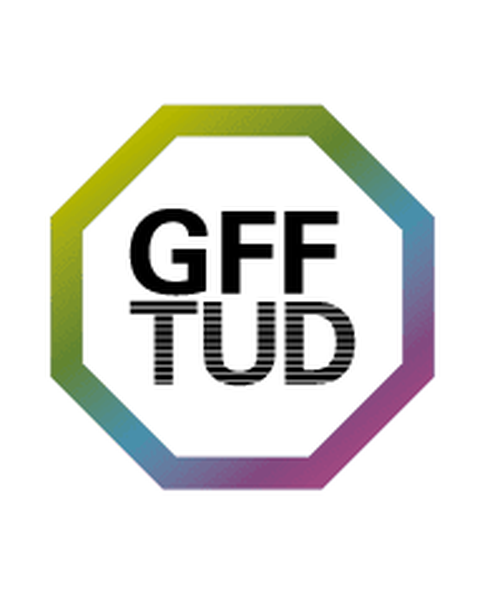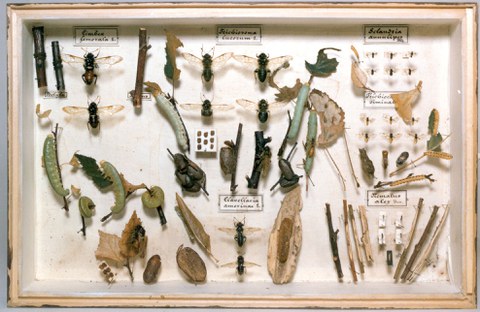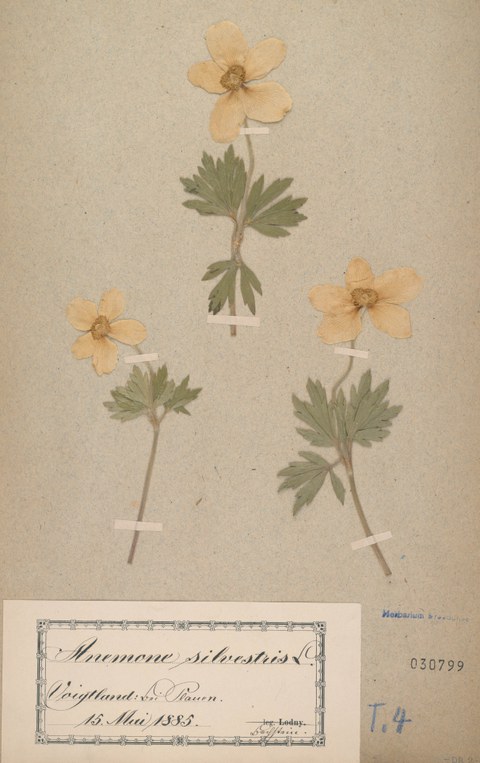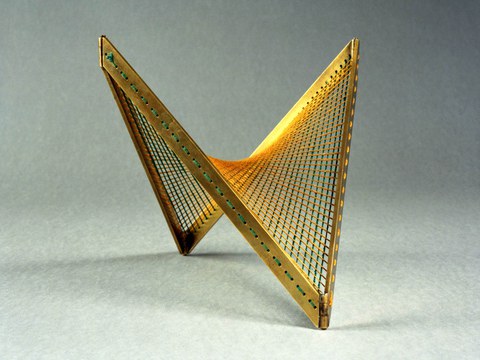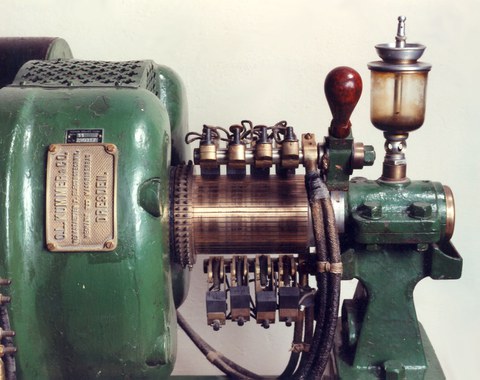Funding of collection projects by the GFF
New call for collection funding
In 2018, the Society of Friends and Supporters of TU Dresden (GFF) launched a support program for TU Dresden's university collections together with the Office for Academic Heritage, Scientific and Art Collections. Following the successful evaluation of the projects funded in the years 2018 to 2020, the GFF Executive Board has decided to extend the funding. Applications for project funding in 2023 can be submitted to the Office for Academic Heritage until January 31, 2023. The GFF Executive Board decides on the funding.
With its funding, GFF aims to strengthen these collections as an infrastructure for teaching and research, to make them visible to the public both internally and externally, and to preserve them permanently. A special focus is placed on the aspect of sustainability of the funded projects.
Funding Priorities
Funding is available for projects that are developed specifically for the use of university collections in research, teaching and transfer, such as
- innovative teaching concepts/projects with collections or selected collection holdings
- promotion of young researchers: research with collections or selected collection holdings
- preparation of an application for third-party funding for collection-related research
- measures to increase public awareness
Sponsorship 2022
Artistic Staff at the TU Dresden after 1990: Effects on Collection and Exhibition Activities in the Art Collection of the TU Dresden
Gwendolin Kremer, University´s Art Collection of TUD, in cooperation with Prof. Niels-Christian Fritsche, Chair of Architectural Delineation, Faculty of Architecture, TUD, and Dr. Christin Lübke, Department of Art Education, Institute of Art and Musicology, TUD
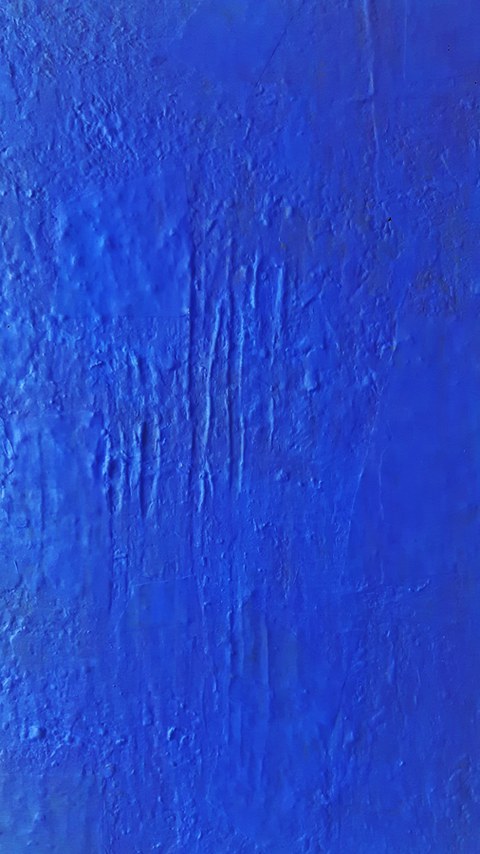
Petra Resch: Monochrom blau (2018); Kunstbesitz der TUD
Even after the peaceful revolution of 1989/90, the practice of involving artistic lecturers, usually graduates of the Dresden University of Fine Arts (HfBK Dresden), in teaching continued in the Faculty of Architecture, especially at the Chair of Architectural Delineation, and in the newly established Department of Art Education at the Institute of Art and Musicology.
Due to the reorganisation of the TU Dresden as a full university from 1992, as well as the restructuring of the Artistic Advisory Board, which was responsible for the fate of the art collection from 1954 to 2003, and its integration into the Office for Academic Heritage (Kustodie) of the TU Dresden, the connection of artists teaching at the TUD to the art collection has been less prominent since the 1990s, and there is a lack of information on the teachers themselves and their work.
This desideratum will be addressed in a research and exhibition project (April 28 to July 7, 2023 / opening: April 27, 2023). A publication will accompany the project.
Capturing and digitising the formation herbarium of Prof. Dr. Oscar Drude // Herbarium Dresdense, Faculty of Biology, Institute of Botany, Dr. Sarah Wagner
Image
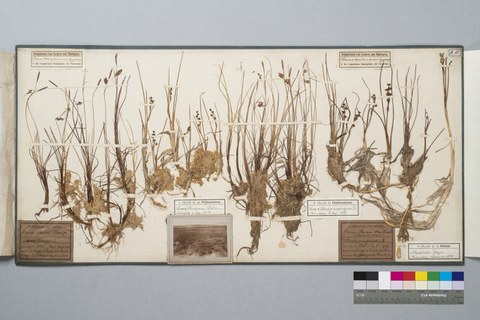
Herbarium record from the formation herbarium of Drude
Prof. Oscar Drude was the first holder of the newly founded professorship of botany at the Dresden Polytechnic, the predecessor of today's TU Dresden. One of his main works is "Die hercynische Flora" (The Hercynian Flora), published in 1902, which describes and evaluates the vegetation and flora of Central Germany from a plant-geographical perspective. Drude also gave lectures on this subject and created a formation herbarium for such lectures, in which several plants were compiled into large herbarium specimens according to ecological criteria in order to represent vegetation units or plant societies. The aim of the project is the first complete recording, digitalisation and publication of the formation herbarium with 220 herbarium sheets by Oscar Drude.
Sponsorship 2020
VOCAL RESONATOR: Impact of the materials on the acoustic features of historical and modern vocal resonators – The link between research related to the collections and current teaching // Historical Acoustic-Phonetic Collection (HAPS), Institute of Acoustics and Speech Communication, Professor Dr.-Ing. Peter Birkholz & Professor Dr.-Ing. habil. Rüdiger Hoffmann
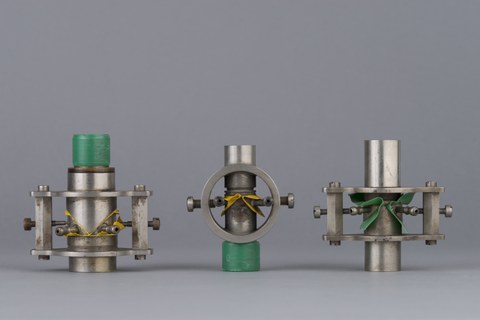
Stimmlippenmodelle
In its Historical Acoustic-Phonetic Collection (HAPS), TU Dresden holds a collection that represents the development of experimental phonetics and speech technology from the middle of the 18th century up to the second half of the 20th century, one with unparalleled coherence in Europe. Thematically, HAPS is closely linked to current research at the Chair of Speech Technology and Cognitive Systems that considers the exploration of speech production. Here, approximate physical models of the vocal tract and articulators are developed and explored, which in turn serves to improve understanding of the physics of speech generation and could be used in speech robots or as medical implants in the future. The aim of the sponsored research project is to characterize historical speech devices and vocal resonators from HAPS together with modern vocal resonators and compare these, as well as to experiment with new materials and elaborate a demonstration trial for the "Speech Synthesis" lecture.
Research project for improvement of the applicability of the Forest Zoological Collection for research and teaching, including accompanying restoration measures // Chair of Forest Zoology Professor Dr. habil Mechthild Roth, Cornelia Scheibner
The TU Dresden Chair of Forest Zoology has historically developed collections with approx. 50,000 individual specimens that offer a unique survey of national fauna. The Tharandt Collection already found its way into publications in the 19th century. It has been actively used in teaching and for research purposes up to today. The aim of the sponsored project is the long-term preservation of the collections, as well as enhancing usability for research and teaching. In particular, the objective is to improve the functionality and positioning of the historical collection cabinets with forest zoological material, to facilitate accessibility and, at the same time, carry out urgently required repair and restoration measures.
Sponsorship 2019
Restoration of the botanic collection of the natural history collection of the Moravian church // Herbarium Dresdense, Faculty of Biology, Institute of Botany, Dr. Sarah Wagner
In 2019, among others, a project headed by Dr. Sarah Wagner, Faculty of Biology, Institute of Botany on the Herbarium Dresdense (Dr. Sarah Wagner) was selected for sponsorship by the GFF Board. The botanic collection of the Moravian church is, in terms of cultural history and botany, a unique section of the TU Dresden Herbarium Dresdense collection. It has special value as it constitutes one of the oldest herbal collections and, in addition, bears witness to the involvement of missionaries in the scientific processing of natural history objects. The funding has enabled the collection to be processed for the first time, taking aspects of cultural history and botany into consideration. Together with historians, meaningful criteria have been defined. These include for example, the mounting form, or in other words, how the plant material was prepared and attached to sheets of paper and the presence of watermarks. Up to now, about half of the collection could be processed, taking these points into consideration. Parallel to this, the documents are being digitalized and, after the data collection, becoming accessible online via the JACQ Virtual Herbaria collection database. More information is available here.
Sponsorship 2018
Integration of material mathematical models in activity-oriented teaching concepts for teacher training in mathematics // Mathematical Models Collection, Faculty of Mathematics, Institute of Geometry, Professor Daniel Lordick, Collection Officer & Institute of Analysis, Professor Dr. Andrea Hoffkamp, Chair of Didactics of Mathematics
The Geometric Modeling and Visualization Research Group and the Chair of Didacticsof Mathematics intend to develop and evaluate innovative and activity-oriented teaching concepts for students in teacher training for mathematics by integrating and further developing the Mathematical Models Collection. The aim is a targeted utilization of the material mathematical models for teaching and, beyond that, an expansion of the collection. The intention is to establish a systematic connection between object-related research and activity-oriented didactics via the material models. A historical-genetic approach for learning and teaching mathematics is particularly important. In this way, it can be demonstrated that mathematics is a dynamic science with a long historical development, as is naturally reflected in the historical model collection. More information is available here.
Conception of 3D digitalization // Collection of Historical Electrical Machines, Chair of Electrotechnology and Information Technology, Electrotechnical Institute, Dr. Nicol Hildebrand
The Electrotechnical Institute's project aims to make 70 electrical machines from the Collection of Historical Electrical Machines accessible with modern media for both experts and nonprofessionals. The plan is to carry out 3D digitalization on film and in graphics, provide accessibility to the exhibits for the institute's lectures and the visitors to the Görges Building, while, at the same time, enable improved interaction between the individual and the exhibited object. The aim is to visualize three basic functional principles of electrical machines: Direct current, asynchronous three-phase current, and asynchronous three-phase current.
Ideally, the plan is to create a pilot solution with this project that will also be relevant for other TU Dresden collections.

